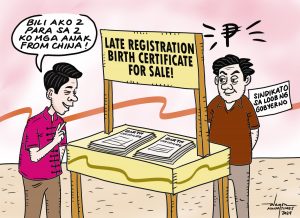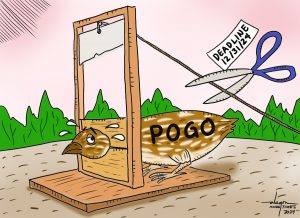LATE LAST week we read a post on the Davao City Water District’s (DCWD’s) social media platform set up to disseminate information from the water firm to its thousands of consumers.
The post coming from a certain Antonio, a customer, says that the late payment charge (LPC) imposed by DCWD on the consumer’s monthly water bill is roughly 10 percent. The LPC is effective a day after the payment deadline expires.
That revelation stunned us. Immediately we got hold of our water bill for the period December 27, 2023 to January 25, 2024 to check the correctness of consumer Antonio’s claim. And indeed his claim was proven right. When we have our own computation of the LPC we found out that the rate was 9.9 percent of the bill sought to be paid.
Consumer Antonio also said in his post that the charge imposed by DCWD is three times the interest rate credit card and other financial institutions are charging which is 3 percent.
We also checked the interest rate imposed on LPC by another utility company that distributes power in the city. We learned that the power firm only imposes 2 percent on customer’s LPCs.
Well, there is no doubt that DCWD provides one of the five basic needs of the people – water. It is a natural resource drawn for free from the aquifer or from sources on the surface of the earth like rivers and lakes.
What are being spent for by the water utility are the various processes required to distribute the water to the consumers. However, despite being a public utility the water distribution rate is something that has escaped attention of government officials who are supposed to be guardians of the interest of the consumers.
Of course there is one agency that is supposed to determine the fairness of the water rates – the Local Water Utilities Board. But based on previous petitions for rate increases by the DCWD, it appears that the National Capital Region (NCR)-based agency has never conducted a down-to-earth consultation with the parties affected by any rate hike.
We could not remember any single hearing conducted by the LWUB right in Davao City. Even local legislators only conducted some kind of “token” hearings only just to have some venues for the consumers to let out their take on rate increase proposals.
In other words, the LWUB only depends on inputs provided by the water firm for them to determine the supposed fairness of the rate hike sought. And that is for rate adjustments only.
What about the rate for the LPC that the DCWD is imposing on its consumers; who decides on it? We assume it is only the water distribution firm’s Board of Directors.
Again we are back in saying that DCWD is in the service of providing one of man’s basic needs. It is unfortunate that only a few people comprising the board who determine the LPC. To think that in Davao City there could already be more or less some half a million water consumers many of whom could be paying their water bills way after the deadline is due.
We are now throwing on Councilor Louie John Bonguyan this challenge: Can he possibly look into the charter that mandates the operation of DCWD and find out whose responsibility is determining the LPC? As chair of the Sangguniang Panlungsod’s Committee on Energy and Water Bonguyan can do justice to his chairmanship if he can look into the issue of LPC determination and whether or not the 9.9 percent rate is not usurious and highly disadvantageous to the people the councilors are sworn to serve.
Is it not quite disturbing that the City Council seems to be oblivious of one of its duties which is to protect the interest of its constituents?
On the other hand, how come that the public utility distributing electricity in the city is imposing only 2 percent on LPCs, the water firm which is extracting its merchandise for free is imposing an almost 10 percent rate?
And by the way we read on the same DCWD information dissemination platform that it is congratulating the Apo Agua for the inauguration and the start of operation of its Bulk Water Supply Project, a partnership with the water distribution firm.
In other words water from the Apo Agua Plant is already passing through DCWD’s pipes going to consumers.
We are just surprised that until yesterday cellular phone screens of Davao City residents are still littered with announcements of water service interruptions here and there. All the while we thought the augmentation of water supply from the Apo Agua plants will put an end to water service outages.
-30-


